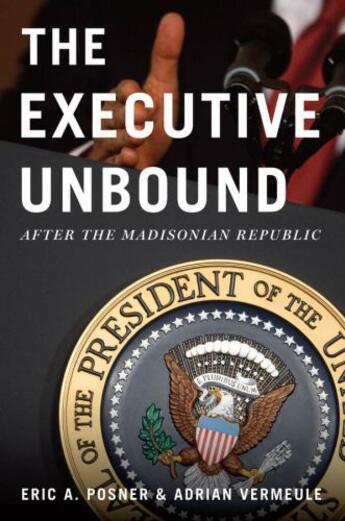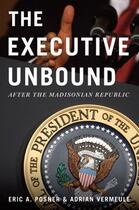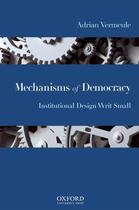-
Nombre de pages : (-)
-
Collection :
(-)
-
Genre :
(-)
-
Thème :
Non attribué
-
Prix littéraire(s) :
(-)
Résumé:
Ever since Arthur M. Schlesinger Jr. used "imperial presidency" as a book title, the term has become central to the debate about the balance of power in the U.S. government. Since the presidency of George W. Bush, when advocates of executive power such as Dick Cheney gained ascendancy, the... Voir plus
Ever since Arthur M. Schlesinger Jr. used "imperial presidency" as a book title, the term has become central to the debate about the balance of power in the U.S. government. Since the presidency of George W. Bush, when advocates of executive power such as Dick Cheney gained ascendancy, the argument has blazed hotter than ever. Many argue the Constitution itself is in grave danger. What is to be done?
The answer, according to legal scholars Eric Posner and Adrian Vermeule, is nothing. In The Executive Unbound, they provide a bracing challenge to conventional wisdom, arguing that a strong presidency is inevitable in the modern world. Most scholars, they note, object to today's level of executive power because it varies so dramatically from the vision of the framers of the Constitution. But Posner and Vermeule find fault with James Madison's premises. Like an ideal market, they write, Madison's separation of powers has no central director, but it lacks the price system which gives an economy its structure; there is nothing in checks and balances that intrinsically generates order or promotes positive arrangements. In fact, the greater complexity of the modern world produces a concentration of power, particularly in the White House. The authors chart the rise of executive authority, noting that among strong presidents only Nixon has come in for severe criticism, leading to legislation which was designed to limit the presidency, yet which failed to do so. Political, cultural and social restraints, they argue, have been more effective in preventing dictatorship than any law. The executive-centered state tends to generate political checks that substitute for the legal checks of the Madisonian constitution.
Piety toward the founders and a historic fear of tyranny have been powerful forces in American political thinking. Posner and Vermeule confront them both in this startlingly original contribution.
Donner votre avis
















